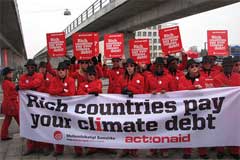A couple of years ago, countries participating in the UN climate summit couldn't come to any real accord, but did agree to commit to reaching a broad, legally-binding agreement at the 2015 UN meeting in Paris.
Coming to a resolution for commitment to CO2 emissions will not be easy, as recent negotiations have shown. And in the US at least, any binding treaty would have to be confirmed in the US Senate, a dicey proposition to say the least. The US actually agreed to be part of the Kyoto accords back in 1997, but the Clinton administration never even took it to a vote in the Senate, where it faced certain defeat.
Complicating matters for a general accord is the fact that countries such as China and India have in effect said they are not interested in any agreements that would have an impact on their economic growth. The leaders of both those countries were noticeably absent from a UN Climate meeting last week in New York City, a prelude of sort to the big annual meeting in Lima, Peru in December.
While the focus has been to a large extent whether the US and other nations can come to an agreement next year on emission reduction commitments, a less publicized but likely just as thorny an issue will be to what extent developed countries will make payments to less developed ones to help them "transition" to low carbon economies much faster than they might without such assistance.
In 2009, a group of developed nations pledged to provide $100 billion a year by 2020 to developing countries, though what would really happen to those dollars might be considered a question, as is how the funds would be allocated to different nations.
From 2010 through 2012, a fund of about $10 billion annually was raised, $2.5 billion or so of that from the US, but details about where that money is going and by what criteria remains shrouded in mystery. The US said it committed about $2.7 billion in 2013. The entire EU block said it will commit 1.7 billion euros for the year 2014-2015.
At the UN Climate summit last year in Warsaw, the developing countries demanded a firm plan as to how that fund is going to ramp-up between the $10 billion level then and the $100 billion in 2020. Such a plan is still missing.
And of course, at that meeting, many developing countries began saying that even the $100 billion transfer level will be grossly insufficient to meet their needs. Others are asking for "reparation" payments they say are deserved for environmental damage they say they have suffered as a result of countries like the US and those in Europe spewing lots of carbon in the air for many decades.
China Tells West to Ante Up
With that backdrop, the Chinese issued a report last week during the New York meeting making clear how it sees the process going - and that involves lots of developing economy cash flowing its way.
 Despite the fact that China is the world's second largest economy and thought likely to soon overtake the US in the top spot, China considers itself a developing economy, and thus entitled to a large share of the money its expects to flow from developed to developing nations. Despite the fact that China is the world's second largest economy and thought likely to soon overtake the US in the top spot, China considers itself a developing economy, and thus entitled to a large share of the money its expects to flow from developed to developing nations.
The China paper says that "developed countries are responsible for the current and future concentration of greenhouse gases in the atmosphere because of their historical, current and future emissions, and developing countries have the right to equitable development opportunities and sustainable development."
Carbon emission cutbacks by China and other developing countries, the document adds, will be "dependent on the adequate finance and technology support provided by developed country parties" to developing ones.
In other words, China - the world's largest CO2 emitter by far - will reduce its emission levels if developing countries pay for it.
China further states that the incentive payments it demands must come from "new, additional, adequate, predictable and sustained public funds."
The $100 billion in promised payment starting in 2020 (admittedly not exactly assured) is just a "starting point," the China paper says, adding that these money transfers must be laid out with a "clear road map," which includes "specific targets, timelines and identified sources."
In the longer run, developed countries should be committing "at least 1 percent" of their Gross Domestic Product" towards such climate payments, the Chinese add. In the meantime, the $100 billion pledge to the same fund should be reached by $10 billion increments, starting from a $40 billion floor this year.
To be clear, the $100 billion commitment is meant to be an annual figure, the duration of which isn't clear.
There is a lot more of this - the full Chinese paper can be accessed here: China's Submission on the Work of the Ad Hoc Working Group on Durban Platform for Enhanced Action
China also adds that ""Commitments by developed country Parties [to the new treaty] on providing finance, technology and capacity-building support to developing country Parties shall be of the same legal bindingness as their mitigation commitments."
This funding mechanism is sure to be hugely controversial, both in the US and in Europe, where many developed economies are still pursuing "austerity" to keep budget deficits within tolerable ranges - and calls for tens of billions of Euros in funding to China we guess will not go over well.
Pay attention to this one.
Do you see the transfer monies being a big issue to a climate accord? What do you think of the China paper? Let us know your thoughts at the Feedback button below.

TheGreenSupplyChain.com is now Twittering! Follow us at www.twitter.com/greenscm
|